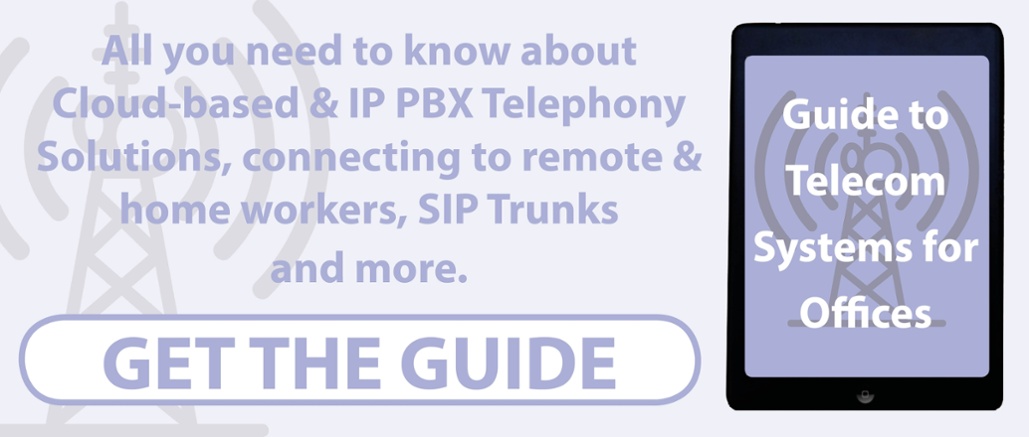
Cloud-based phone systems for businesses can cut overheads, keep businesses communicating 24/7, improve service levels, and stay up-to-date with technological advances.
Communication is the lifeblood of all businesses. Whether it's in-house, B2B, or for recruitment and training, effective communication is the glue holding it all together. And for any business offering customer support via all available contact channels like email, phone and online live support, having the right systems in place is critical to their success. It's now the age of the customer. Big businesses are investing billions in streamlining their 'customer experience' so they keep their customers happy, engaged and, importantly: loyal.
Keep up-to-date
Times have changed. People want more, and they want it now. The technology is there to facilitate it all, so people expect things to work, to, at the bare minimum, speak to the right person. In short, there's no excuses for poor service, which is often down to bad communication rooted in an inefficient telecoms system.
From surviving to thriving: cloud-based phone systems for businesses
In the days of traditional telephony, a business would have various phone lines trailing in and out of every office. The bigger the business, the more lines, the more complicated it all looked (and was). Today, depending on the nature of its business, these have been replaced by various modern equivalents. They don't necessarily look any tidier, if you've seen inside a contact centre, you'll be nodding to agree. Maybe your office doesn't look much better.
You might be familiar with a few of the devices, but you probably don't really know or care about the exact ins and outs of how they work, just that they work well (because they don't come cheap). There's probably an IT guru who monitors everything and tells you it's fine. But is it?
With new technology comes the death of the old
Things like ISDN lines will be dead by 2025, phased out completely. And anything linked with some contact centre communication infrastructures and service levels have warranted their own reality show - the opposite of what Big Business is doing in the age of the customer. Chances are, your infrastructure resembles neither, but if you had to choose one, which would it be? Do you want to survive or thrive?
Things change whether we like it or not, and a company with outdated software and hardware is out of style, and likely not prepared for change like sudden growth. What matters to most of us is that things (technology) make life easier, not more complicated. VOIP makes communication easier, faster, safer, a lot less complicated, and cheaper. It's the way forward.
VOIP: understanding the power of intelligent cloud-based phone solutions
Voice over the Internet Protocol, opens up a world of possibilities to streamline all communication methods into one place. It allows businesses with multiple office locations to continue taking or making calls if one location's system fails, with no interruptions to service. It enables local, national and international conference calls to take place effortlessly. Cloud-based systems can not only route calls, they can also help monitor performance and highlight trends too, meaning you can make any adjustments to meet the ebbs and flows. Staff can work remotely and access information more securely; you can hire remote workers to cover busy periods and use your workforce more productively.
Imagine how a cloud-based phone system could help your business
Each business has different needs, so it's hard to say exactly which telecoms solution will work best for yours. To stay connected and offer the level of service both industries and individuals expect today requires a balancing of old and modern technologies. Knitted together, phone lines, unflappable internet connections, and things like PBX systems (pivotal for multiple office locations) create robust communication networks to rival any big brand's.
Be ready for anything: growth, fame, reputation
It's probably not your job to fully understand the complexities behind modern communication infrastructures and their many acronyms. It would be like looking at a 1950s telephone exchange and being expected to know which wires go where. But if and when it fails, you'll probably be responsible for finding a solution and managing the chaos. As the saying goes, prevention is better than the cure. Knowing you have a smart telecoms solution in place to orchestrate everything is one less thing to worry about, isn't it?
Cut costs, minimise maintenance, protect data
Making the switch should save money, and it will broaden your communications arsenal and prepare you for any future changes - of which there are bound to be many. Moving everything to the cloud, a virtual environment external to your infrastructure, means your service provider is responsible for maintaining things like servers, which will be housed in one of their giant data centres. Previously, growth meant the expense of installing your own servers, or increasing their capacity, but that's not necessary with this type of technology. You should only pay for the amount of users, not the amount of data they are using.
Of course, data security is also now as important as locking your office, so you should discuss this and any other queries with a specialist who will also explain any jargon (you think you should understand). Or ask them to put it in the new cloud system so your IT guru, wherever he or she is located, can access and digest it while you manage your empire.
What to look for in a telecommunications specialist
Like interviewing a potential employee, the first step to creating a streamline communications system is to discuss the ins and outs first, so you should be offered a consultation. You want an honest suggestion inline with your business needs, regardless of what's considered modern and cool. Importantly is flexibility, that it can grow and be adapted to suit your business needs.
Finally, check that you don't have to do anything other than run an empire, that they will take care of the details. Expect your cloud specialist to install and set it up and show someone how to use it. Though, there's nothing complicated about using it, it's as simple as accessing email and as connected as any good social media platform.





